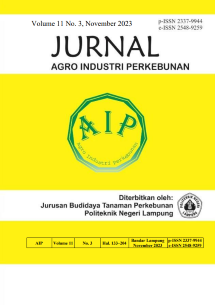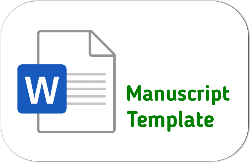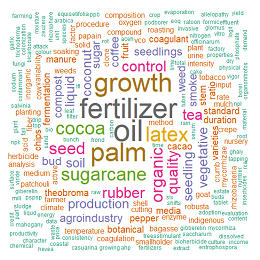Pengaruh Faktor Sosial Ekonomi terhadap Daya Saing Kelapa Sawit di Kabupaten Paser
DOI:
https://doi.org/10.25181/jaip.v11i3.3264Keywords:
competitiveness, Kertabumi, palm oil, SEM-PLS analysis, socio-economicAbstract
Many factors influence the development of oil palm, including socio-economic factors. Factors supporting success in oil palm cultivation must be considered as their contribution to the competitiveness of Indonesian palm oil to be accepted in export-destination countries. This study aims to determine the influence of socioeconomic factors on the competitiveness of oil palm. This research was conducted in Kertabumi Village, Kuaro District, Paser Regency, East Kalimantan Province. Data was collected in July-August 2023 with the questionnaires and interviews with respondents. Respondents in this study amounted to 65 farmers were determined using purposive sampling who members of the Bumi Subur cooperative in Kertabumi Village, Kuaro District, Paser Regency. The data analysis method uses the structural equation model-partial least square with the help of Smart-PLS software to find out what socio-economic factors affect the competitiveness of oil palm in Paser Regency, East Kalimantan Province. The results showed that the innovation factor of oil palm cultivation and the factor of production facilities had a positive and significant effect on the competitiveness of oil palm in Paser Regency, especially in Kuaro District, Kerta Bumi Village. This states that one way to improve the competitiveness of oil palm is to pay attention to the old factors of oil palm cultivation innovation, such as cultivating according to operational standards and environmentally friendly, to get an ISPO certificate. In addition, it is important to have complete production facilities by farmers to support oil palm cultivation and increase palm oil production.Downloads
References
Abdina, M. F. (2019). Analisis dampak perkebunan kelapa sawit terhadap sosial dan ekonomi masyarakat di Kabupaten Asahan. Journal of Education, Humaniora and Social Sciences (JEHSS), 2(2), 292–304. https://doi.org/10.34007/jehss.v2i2.109
Amrizal, M., & Suryani, P. (2022). Faktor-faktor sosial ekonomi yang mempengaruhi pendapatan petani sebelum dan sesudah replanting kelapa sawit di kampung keranji guguh. Manajemen Studies and Entrepreneurship Journal, 3(1), 143–150.
Arman, I., & Achmad, F. S. (2018). Analisis pengambilan keputusan petani dalam program peremajaan kelapa sawit di kecamatan dolok masihul kabupaten serdang bedagai. Jurnal Agrica Ekstensia, 12(2), 47–60.
BPS. (2022). Statistik Kelapa Sawit Indonesia 2021. Badan Pusat Statistik.
Ghozali, I., & Latan, H. (2015). Partial Least Squares: Konsep, Teknik dan Aplikasi menggunakan Program Smart PLS 3.0. Badan Penerbit UNDIP.
Ivana, H., Priyono, B. S., & Reflis, R. (2012). Usaha perkebunan kelapa sawit rakyat di Desa Nanti Agung, Kecamatan Ilir Talo, Kabupaten Seluma. Agrisep, 11(1), 69–77.
Jiuhardi, J., Wijaya, A., & Nurjanana, N. (2023). Usaha perkebunan dan pengembangan produksi kelapa sawit di kecamatan busang Kabupaten Kutai Timur. FORUM EKONOMI: Jurnal Ekonomi, Manajemen dan Akuntansi, 25(1), 106–115.
Latifah, Z., & Kadir, K. (2021). Performa komoditas minyak sawit Indonesia di tataran global: Performa komoditas minyak sawit Indonesia di tataran global: Mampukah kita menjadi pemain kunci? JSEP (Journal of Social and Agricultural Economics), 14(3), 250–268. https://doi.org/10.19184/jsep.v14i3.26550
Nibras, G. S., & Widyastutik, W. (2020). Daya saing, ekuivalen tarif, dan faktor-faktor yang memengaruhi permintaan ekspor minyak sawit Indonesia di negara OKI. Jurnal Ekonomi Dan Kebijakan Publik, 10(2), 111–124. https://doi.org/10.22212/jekp.v10i2.1295
Putra, C. P., Sadono, D., & Susanto, D. (2020). Perceptions of Smallholders farmers on oil palm plantation cooperative in Kongbeng, East Kutai. Jurnal Penyuluhan, 16(1), 134–146. https://doi.org/10.25015/16202028295
Ridwannulloh, R., & Sunaryati, S. (2018). Determinants of Indonesian crude palm oil export: Gravity model approach. Jurnal Ekonomi & Studi Pembangunan, 19(2), 134–141. https://doi.org/10.18196/jesp.19.2.5004
Saragih, H. M., & Rahayu, H. (2022). Pengaruh kebijakan Uni Eropa terhadap ekspor kelapa sawit Indonesia. JPPI (Jurnal Penelitian Pendidikan Indonesia), 8(2), 296–303. https://doi.org/10.29210/020221377
Savitri, E., & Natariasari, R. (2021). Percepatan pendapatan petani sawit melalui peningkatan kinerja pemasaran dan strategi bersaing. Riau Journal of Empowerment, 4(1), 41–47. https://doi.org/10.31258/raje.4.1.41-47
Suwarno, W. (2019). Kebijakan sawit Uni Eropa dan Tantangan bagi diplomasi ekonomi Indonesia. Jurnal Hubungan Internasional, 8(1), 23–34. https://doi.org/10.18196/hi.81150
Tifani, S. (2019). Faktor Sosial Ekonomi yang Mempengaruhi Produktivitas Usahatani Kelapa Sawit (Elaeis guineensis Jacq) (Studi Kasus: Desa Kampung Sennah, Kecamatan Pangkatan Kabupaten Labuhanbatu) [Unpublished undergraduate thesis]. Universitas Sumatera Utara.
Wijayanti, T. (2012). Faktor–faktor sosial ekonomi yang mempengaruhi pinjaman kredit pola plasma kemitraan petani kelapa sawit. EPP, 9(1), 42–47.
Downloads
Published
How to Cite
Issue
Section
License
Copyright (c) 2023 Muhamad Yazid Bustomi, Adnan Putra Pratama, Andi Lelanovita Sardianti, Zainal Abidin, Doddy Prima, Pandhu Rochman Suosa Putra, Mika Debora Br Barus

This work is licensed under a Creative Commons Attribution-ShareAlike 4.0 International License.
Authors who publish with Jurnal Agro Industri Perkebunan agree to the following terms:
Authors retain copyright and grant the Jurnal Agro Industri Perkebunan right of first publication with the work simultaneously licensed under a Creative Commons Attribution License (CC BY-SA 4.0) that allows others to share (copy and redistribute the material in any medium or format) and adapt (remix, transform, and build upon the material for any purpose, even commercially) with an acknowledgment of the work's authorship and initial publication in Jurnal Agro Industri Perkebunan.
Authors are able to enter into separate, additional contractual arrangements for the non-exclusive distribution of the journal's published version of the work (e.g., post it to an institutional repository or publish it in a book), with an acknowledgment of its initial publication in Jurnal Agro Industri Perkebunan. Authors are permitted and encouraged to post their work online (e.g., in institutional repositories or on their website) prior to and during the submission process, as it can lead to productive exchanges, as well as earlier and greater citation of published work.


























